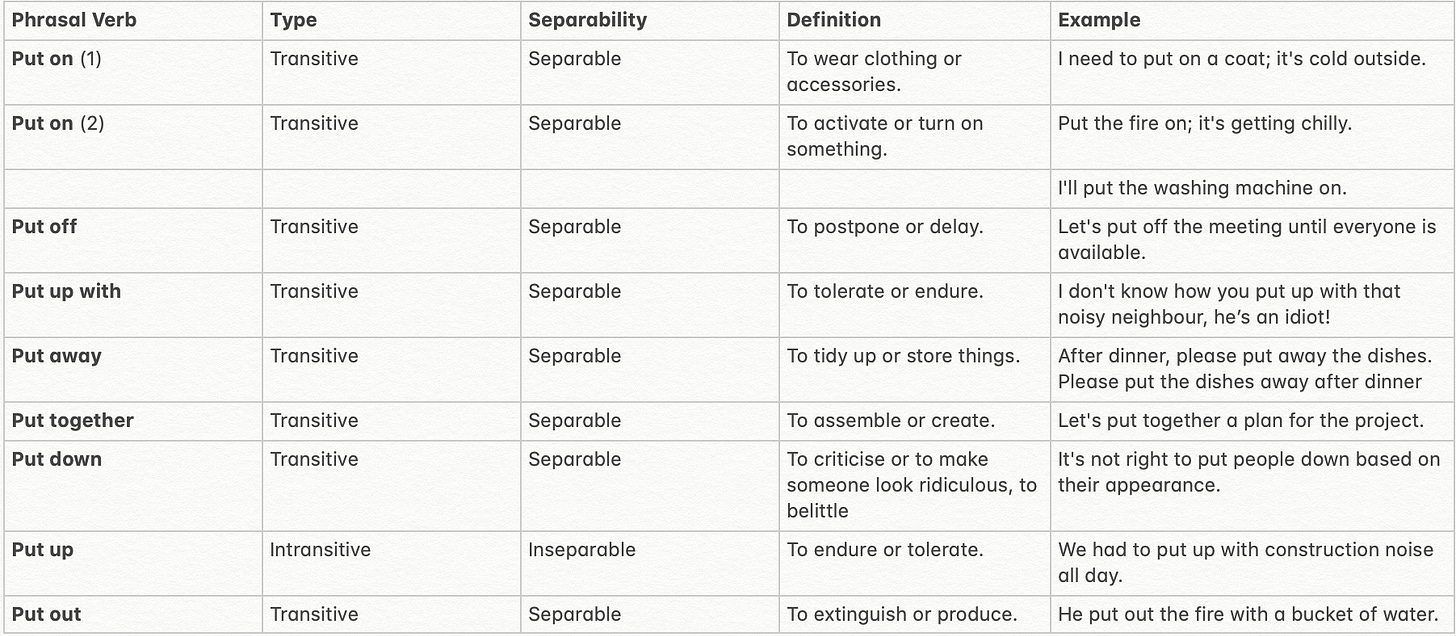What is a phrasal verb?
A phrasal verb is a combination of a verb and a preposition or adverb. When used together they have a different meaning to the original verb when it’s alone.
They can actually be a nightmare for English learners. Learning something that doesn’t exist in your own language can be tough! (I remember! ) and actually, until I started teaching English and listening to myself talking to my family and friends, I didn’t realise just how common phrasal verbs are.
One of the handicaps for English learners is that phrasal verbs often have idiomatic or colloquial uses. I’m sure you have all heard the phrase “chill out” or “hang out”. Sometimes, the meaning of a phrasal verb can be more obvious and you can guess it from the context or from thinking about each individual part of the phrasal verb to try to understand it. Unfortunately, that doesn’t always work and you have to tediously learn the meanings one by one and try to incorporate them into your language (first passively (understanding them when reading and listening) and then start trying to use them actively in any language that you produce such as in speaking or writing)
I think, from experience, learning phrasal verbs in context is one of the best ways to learn them. I would advise you to learn the common ones. If you hear them in conversation and are unsure about the meaning, don’t get too hung up on it. If you do study phrasal verbs, you’ll probably end up understanding more of them than you actually use (passive vocabulary) because they may not come as naturally to you as they would a native speaker, unless you make a real conscious effort to learn them.
TOP TIPS!
Don’t try and learn a whole list
Choose a couple and learn them.
Learn the ones you think you will use
Try and practice them in context
Types of Phrasal Verbs
We can divide phrasal verbs into 4 types. Stay with me here, don’t think I’m getting too technical for you, there is a reason I’m explaining this.
Have you ever noticed that sometimes you can say: Pick the baby up or pick up the baby? Why? Why can you say to calm someone down, but not calm down someone / put up with something but not put something up with…
Aghhh! This is complicated:
Transitive - This phrasal verb needs an object:
I ran into my mum in the supermarket. (my mum - this is the object)
You can’t say - I ran into .. with nothing else - it doesn’t make sense.
Intransitive - This type of phrasal verb doesn’t need an object
I get up at 7 am. (We don’t say - I get up myself)
Separable - these phrasal verbs are when you can separate the verb from the preposition/adverb for example:
Pick the baby up / Pick up the baby
Take off - take my shoes off / Take off my shoes.
Look up - I looked some information up on the computer.
I looked up information on the computer (no difference in meaning from the sentence above)
Inseparable - This verb is glued to the preposition/adverb
He came across a photo in his drawer. (we wouldn’t say he came a photo across)
Today, we are going to talk about phrasal verbs with “put”
COMMON PHRASAL VERBS WITH “PUT”
Listen to the audio for more explanations
CAN YOU CORRECT THESE MISTAKES?
Ok, let’s see if you are able to correct the type of common mistakes other students like you might make, especially those who haven’t listened to this audio / read this article!
1.Please, put away!
Put away is a transitive verb so it needs an object- we could say: Please put it/them away/ put the book away / put your shoes away.
2. I don’t know how you put your brother up with! - This verb is inseparable - meaning that we can’t put the object in the middle of the phrasal verb. Put up with someone- I don’t know how you put up with your brother.
3. I need to put the oven on an hour before dinner.
This one is fine. Put on the oven or put the oven on! I tricked you!
That’s all for now folks! I hope you found this article useful and that it helped you understand a little more about phrasal verbs. If you are interested in more of this type of content, let me know!
















Share this post